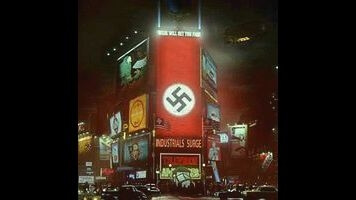Again we begin in the immediate aftermath of the previous episode, with Frank being spotted holding a gun at the rally immediately after the crown prince has been shot. As he’s fleeing the scene, he drops the necklace Juliana left behind; it proves to be a charmed piece of jewelry indeed when it is picked up by Tagomi, who drops it later in the episode when Juliana runs into him while fleeing a job interview gone awry (more on this later). Is this an enchanted talisman, or simply an ornamental plot convenience? Maybe there’s no real difference between the two.
Frank and Juliana have an awkward reunion at their apartment, where he doesn’t come out and say “You know you got my sister and her kids killed, right?” but it’s definitely hanging in the air. Juliana has to find out from her mother and stepfather, who are also still wondering where Trudy has been all this time. (Juliana is not forthcoming.) The dojo is no solace for her, either: she’s turned away because she’s wanted for questioning by the authorities. Her interrogation is intercut with Joe’s debriefing back in New York, where Obergruppenführer Smith expresses his displeasure with Joe’s rogue actions back in Canon City. Both Juliana and Joe get through their interrogations by weaving a little bit of truth through their big lies, but it’s clear they’re both on the authorities’ radar from here on out.
“Things will never return to normal” is something we hear repeated several times throughout the episode, but for the most part, The Man In The High Castle is all too normal. The novel was far from Philip K. Dick’s trippiest work, but it certainly had its dislocating moments in dealing with alternate realities. For all the possibilities the premise still holds, the series so far is generally content with standard-issue intrigue. The Tagomi/Wegener arc is a case in point: all this business with trying to pass off the microfilm, swallowing and then excreting the microfilm, worrying about an alias being revealed, narrowly escaping being spotted by someone who could blow your cover…these are all generic, boring spy-movie tropes that could play out the exact same way in almost any context. The fact that the players happen to be a Japanese government official and an undercover German officer in an occupied America is just so much window dressing.
The most intriguing elements of the pilot—the Grasshopper films and the titular character (if he even exists)—have receded into the background. Joe sees that Smith has a file marked “Grasshopper” after their debriefing, when the boss invites his young charge over to the house to celebrate VA Day. Juliana goes to search the home of Randall, the Resistance member who slipped her the film, but all she finds is another fighter for the cause who suggests that Randall and Trudy were set up by a contact in the Japanese Authority Building.
New threads with potential to up the intrigue factor are introduced toward the end of the episode. Attending a depressing memorial service for his sister Laura and her children (the Japanese eulogist even gets their names wrong), Frank encounters Laura’s former boss, Mark Sampson, a man we know will have some significance because he’s played by Michael Gaston of everything else on television. Following up on the Resistance member’s tip, Juliana goes for a job interview at the Japanese Authority, which goes awry when her potential employer outlines some of the “personal services” she’ll be required to perform. Given that the series is set during the early Mad Men era, you could look at this as an example of the standard sexism of the time, but given the context, it’s not hard to perceive a queasy racial element to the scene that plays on stereotypes of submissive women in Japanese culture. In any case, Juliana is not up for it and flees the office, which is when she runs into Tagomi. Here’s hoping this chance encounter is the spark that ignites the second half of the season, because that’s exactly what The Man In The High Castle needs right now.
Stray observations
- “If you’re here looking for information about the films, you’ll be disappointed.” Yes, I am definitely getting that impression.
- The prince is in critical condition but not dead, if anyone cares about that.
- The prince’s head of security (or whatever his actual title would be) commits seppuku while simultaneously being beheaded. Harsh.

 Keep scrolling for more great stories.
Keep scrolling for more great stories.
